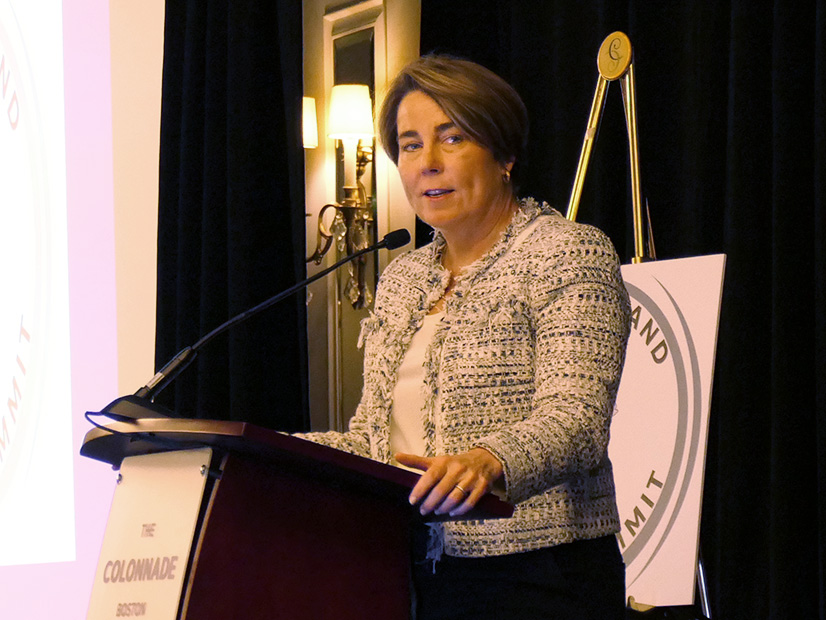
BOSTON — Northeastern states, provincial governments, energy companies and labor groups must work together to address the region’s energy issues, Massachusetts Gov. Maura Healey said Dec. 3 at the New England Energy Summit.
“The benefits of regional collaboration are hard to overstate, which is why we’ve made it a top priority,” Healey told attendees at the conference.
The fifth annual event was held by the New England Power Generators Association and the Dupont Group and coincided with Healey’s ceremonial signing of a major climate law earlier in the day. The legislation features major reforms to the state’s permitting and siting procedures and a range of other provisions intended to boost the state’s clean energy transition. (See Compromise Climate Bill Finally Approved by Mass. Legislature and Mass. Clean Energy Permitting, Gas Reform Bill Back on Track.)
The bill also authorizes the Massachusetts Department of Energy Resources to seek multistate competitive procurements of long-term clean energy generation through 2025. This could include contracts with the two existing nuclear plants in New England.
Healey said she grew up “in the shadows of [the Seabrook nuclear power plant] in New Hampshire. … I understand the importance of a New England regional economy, and I am very committed as governor to working very closely with other governors.”
She also highlighted the importance of collaborating with neighboring Canadian provinces, and said the state is looking beyond just the New England Clean Energy Connect transmission line, which Avangrid projects to come online in January 2026. (See Avangrid Sues NextEra over ‘Scorched-earth Scheme’ to Stop NECEC.)
Despite significant concerns around federal funding and support for decarbonization in the incoming Trump administration, Healey projected confidence around the state’s clean energy efforts.
“I truly believe that what we’ve done here, the investments that we’ve made, put us on really solid footing, and we’re going to move forward boldly on every front,” Healey said, adding that the state’s permitting and siting reforms are essential regardless of the federal administration.
“Notwithstanding where we are in a particular election cycle, we know where we need to go, and I want to get there together,” Healey said.
The effect of the election on New England’s energy industry was a major topic of the day for several other speakers, who generally shared Healey’s perspective that the change in administration will not dramatically impact the overall trajectory of the region’s energy industry.
“We don’t change our business plan based on what’s happening in Washington,” said Erin O’Dea, CEO of Great River Hydro. “I expect New England to continue to lead.”
“I don’t think the federal election really impacts us,” said James Andrews, CEO of Granite Shore Power.
“I would expect nothing to change in the near term,” said Nathan Hanson, president of LS Power. “You may get less support federally,” Hanson added, but he noted the states have in the past picked up the slack left by the federal government.
Michael McKenna, president of MWR strategies and a former Trump adviser, said he expects the new administration to put “a fair-sized emphasis on increasing the ability to dig oil and gas out of the ground and move it around.”
McKenna said he does not expect this emphasis to bring new pipelines into New England but added that he “can’t imagine” that the Everett LNG import terminal will be retired in the foreseeable future.
Market Issues
Speakers also addressed some of the pressing market issues facing the region, with ISO-NE in the middle of major reforms to its capacity market. (See ISO-NE Updates Plans for Capacity Reforms for CCP 19 and Beyond.)
Hanson of LS Power, which owns two gas plants in the region, said New England will need more dispatchable resources as renewables increase on the system.
“We will need more gas generation,” Hanson said. “They will run less, but they’re needed when they’re needed.”
ISO-NE’s Economic Planning for the Clean Energy Transition (EPCET) study, released in late October, found a significant need for dispatchable resources through 2050, which could pose a significant challenge for states seeking to balance the priorities of decarbonization, affordability and reliability. (See ISO-NE Study Lays Out Challenges of Deep Decarbonization.)
Hanson noted that current market prices do not support the development of new resources without state support and said he is closely following the resource accreditation changes underway at ISO-NE. He stressed the need for the RTO to account for the location of gas resources and how this can affect their access to gas.
Andrews of Granite Shore Power expressed concerns about the challenges ISO-NE’s pay-for-performance rules pose for existing generators, arguing they are “extremely punitive.”
Jeff Delgado, managing director of asset management at Lotus Infrastructure Partners, echoed Andrews’ concerns, saying penalties incurred due to equipment breaking down “can be an existential risk for a plant.”
O’Dea of Great River Hydro said existing hydroelectric resources play an essential clean dispatchable role on the grid but require continued support and investment to remain in operation.
“When we think about the clean energy transition, we need to remember our existing resources,” O’Dea said, adding that there is a common misconception that hydro “doesn’t cost anything to run.”
Workforce Challenges
The summit also featured a panel on the workforce challenges faced by the energy industry.
Chrissy Lynch, president of the Massachusetts AFL-CIO, said there is “no worker shortage in our ranks, because these jobs are good jobs.”
Lynch said she has never seen such high interest in energy jobs from high school students. She said increasing access to childcare, training to transition workers from fossil fuel jobs and partnering with unions on clean energy projects would help scale up the workforce.
Lynch praised the Biden administration as an “incredible partner to organized labor” and said she is anxious about how the federal stance toward organized labor will change under a Trump administration.
Mark Melnik, director of economic and public policy research at the University of Massachusetts Donahue Institute, said Republican efforts to target immigrants could harm the workforce in Massachusetts.
“The economic story in Massachusetts is very much an immigrant story,” Melnik said, noting that domestic emigration from the state has in large part been offset by international immigration over the past 20 years.
“We are looking at a different demographic picture over the next 20 years,” Melnik said. “With an aging workforce, immigration is a critical part of growing the labor supply.”




